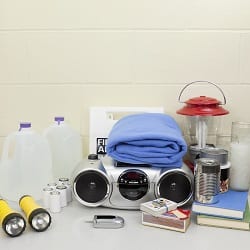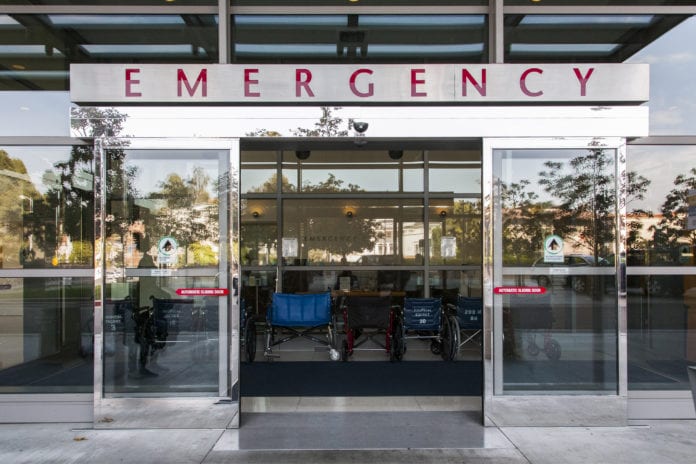 We don’t like to think about it, but emergencies can strike at any time. From major disasters to health scares, it’s important to be prepared so you and your family can cope with whatever comes your way.
We don’t like to think about it, but emergencies can strike at any time. From major disasters to health scares, it’s important to be prepared so you and your family can cope with whatever comes your way.
For some, emergency preparedness is a daunting task. To make it less overwhelming, the Centers for Disease Control and Prevention (CDC) suggest breaking it down into an easy-to-remember, three-step process:
- Get a kit
- Make a plan
- Be informed
1. Get a Kit
Make a kit of supplies you would need in a disaster. The Department of Homeland Security recommends your emergency kit include:
- Battery-powered or hand crank radio and a NOAA weather radio with tone alert
- Dust masks
- Extra batteries
- First aid kit
- Flashlights
- Food (three-day supply of non-perishable food such as energy bars, peanut butter, nuts, canned vegetables and dried fruit)
- Local maps
- Manual can opener for food
- Medication (enough to last three days)
- Whistle
- Moist towelettes, garbage bags and plastic ties for personal sanitation
- Water (three gallons of water to last for three days for each person in your household)
- Wrench or pliers to turn off utilities
Gather your materials and store them in a leak-proof bin in a safe, dry place in your home. Then, determine a set time to check the expiration dates of the food, water and supplies in your emergency kit, which you should do at least twice a year. To be sure you can remember without electronic alerts, since your electronic calendar and alerts may not work in a disaster, make these semi-annual checks coincide with other important events. One example would be to make it a routine part of your spring cleaning and New Year’s goals. These are also great times to change the batteries in your smoke detectors.
Aside from creating and maintaining your emergency kit, you might also consider wearing a medical identification bracelet or necklace to notify emergency personnel of any health conditions.
2. Make a Plan
Sit down with your friends or family members and go over what to do in case of an emergency. Be sure to discuss:
- A fire plan: Talk about safe ways to exit the house and where everyone should meet once outside. If you have children, do a few fire drills so they can learn what the smoke alarm sounds like and where to go.
- A tornado plan: Know where to go during a tornado warning. Discuss what the tornado sirens sound like, and the difference between a tornado watch and a tornado warning.
- Emergency contacts: Make sure everyone knows how to get in touch in an emergency. Memorize important phone numbers since cell phones with programmed numbers may not work.
- Fill out your phone’s emergency information: Many phones have fields you can pre-program for emergency responders with health or emergency contact information in case of an emergency. If your phone doesn’t offer pre-programmed fields, add an “ICE” contact to your contact list. “ICE” stands for “in case of an emergency” and will let emergency personnel know who to contact. You can also add a piece of paper to your wallet with pertinent information.
3. Be Informed
As you gather emergency supplies for your home and discuss communication plans with your family, you should also familiarize yourself with the disasters most likely to happen. Be sure to sign up for alerts that will keep you informed of any potential emergencies. The City of Atlanta’s Mayor’s Office of Emergency Preparedness offers several resources to help residents get prepared, including NotifyATL. This automated system sends out critical information to help keep you safe, including alerts about weather, unexpected road closures and building evacuations.
You should also consider:
- Learning CPR and first aid basics (The Red Cross offers classes around the metropolitan area).
- Locating the evacuation centers in your community in case you need to leave your home.
- Reading about “Run, Hide, Fight” in the case of an active shooter.
Emory Healthcare
At Emory Healthcare, we’re here to help you find the care you need, when you need it. With more than 2,800 doctors and 300 locations, including 11 hospitals, primary care offices, urgent cares and MinuteClinics, we’re delivering specialized care across the region. Find a doctor near you to help you get and stay healthy.
About Dr. Walton
 Velair Walton, MD, is an Internal Medicine Physician at Emory St. Joseph’s Primary Care. Dr. Walton’s clinical interests include Women’s Health and Lifestyle Medicine with a strong focus on diet, exercise, and living a holistically healthy life. She also has a strong interest in chronic disease, particularly empowering patients to navigate their diagnosis through health education.
Velair Walton, MD, is an Internal Medicine Physician at Emory St. Joseph’s Primary Care. Dr. Walton’s clinical interests include Women’s Health and Lifestyle Medicine with a strong focus on diet, exercise, and living a holistically healthy life. She also has a strong interest in chronic disease, particularly empowering patients to navigate their diagnosis through health education.
Dr. Walton is a distinguished member of the American College of Physicians serving on the Wellness Committee for the Georgia Chapter of the American College of Physicians. In addition to her leadership roles in local community organizations such as the Athletic Fitness Association of America, she is a devoted student of the bible regularly serving in her local church.



